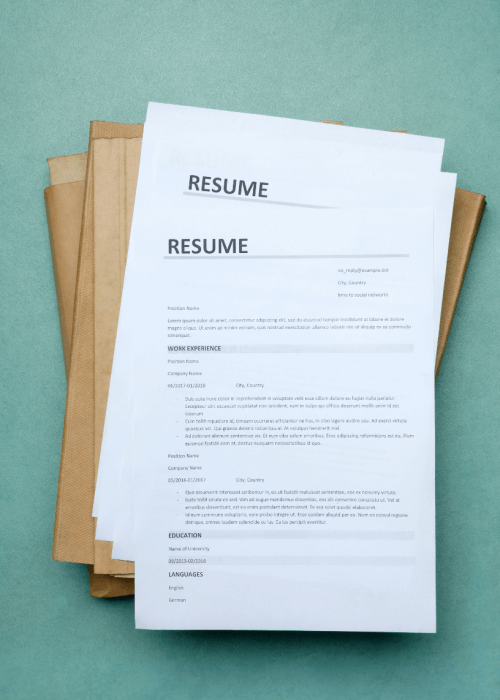A resume is like a movie trailer—it should highlight your most impressive qualities to catch a potential employer’s eye. But, just as a trailer that’s too long or too short can miss the mark, the length of your resume can make or break your job application. The goal? To leave recruiters wanting more.
Resume length often feels like a mystery, so I took a data-driven dive to uncover the truth. We analyzed over 170,000 resumes to see how length varies by profession, and now, I’m here to share those insights with you!
What’s the Average Resume Length?
Our analysis has shown that the average resume length across all professions is 2.59 pages. You may also want to know that the median resume length across all resumes is exactly 2.47 pages, which is very close to the average.
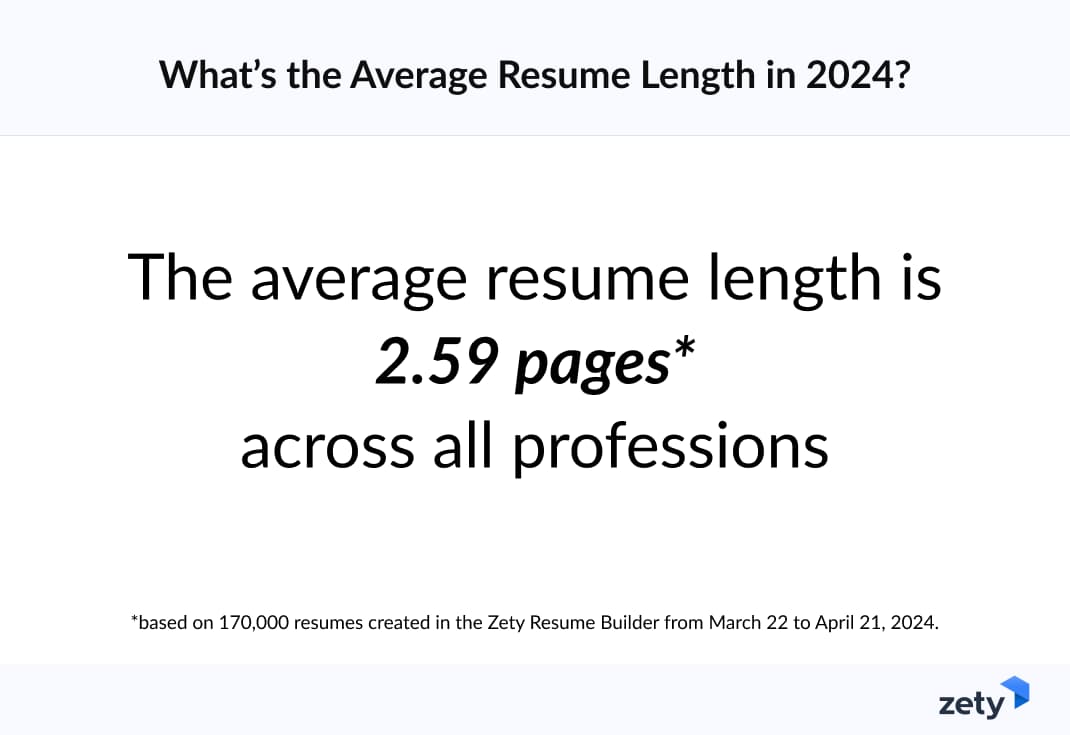 Obviously, we’re talking about the average or the median, which means that many candidates have created resumes that were shorter or longer than the average or median length of a resume.
Obviously, we’re talking about the average or the median, which means that many candidates have created resumes that were shorter or longer than the average or median length of a resume.
But—you may ask—what does impact the resume length? Well, there are some key factors, such as:
- Career stage
- Industry or job type
- Job application requirements
- Formatting and readability
While making a resume takes some time and effort, its target audience—in this case, the recruiter—will spend much less time and effort skimming through it. How much time, to be exact? A study published in 2023 in the journal „Machine Learning & Knowledge Extraction” has shown that it takes 30 seconds to 3 minutes for a recruiter to check out a resume. But—a different study found out that the recruiters initially scan a resume in just 7.4 seconds.
It’s quite obvious that if a resume is to be effective, like a trailer for a record-breaking blockbuster, it needs to be ultra-effective and fast in providing the recruiter with all the information they’re looking for. And that’s where the topic of resume length enters the stage.
The Biggest Resume Length Myth
“Your resume should fit into one page.”
Many myths make people’s lives much harder than they need to be, and the one above is surely one of them. The truth is that how good your resume is is not about length; it’s about grabbing and holding the attention of recruiters.
You can’t always fit all the relevant information into just one page, especially if you have more than a few years of experience.
Your resume can be two pages or even longer, but only when it’s filled with information the recruiter will deem valuable. Caio Sampaio, one of our career experts, agrees:
“Many people still think that you need to squeeze your resume into just one page, when in fact, a two-page resume is the best option for most candidates. A resume should always amount to a specific, full number of pages. That’s why proper resume formatting and managing the white space on your resume are so important. But what if your resume is perfectly formatted, yet there’s still some space left? You can always add extra resume sections to highlight your professional certifications, memberships, awards, or even relevant hobbies and interests that will make you stand out among other candidates.”
Industry-Specific Resume Length Trends
During my detailed analysis, I’ve noticed that the average resume length visibly differs depending on a specific industry. I’ve calculated average resume lengths per job title, and then grouped the results for specific professions depending on the industry. Here’s what I’ve found out:
IT Industry
Average resume length in the industry: 2.73 pages
The IT sector is famous for its complex and highly specialized roles. Professionals in this field often need to prove a wide range of skills and qualifications. No wonder that IT resumes tend to be on the longer side.
For example, software developers typically write resumes that average around 3.2 pages, while network engineers have a similar average resume length of 3.5. The longest resumes in this industry belong to IT consultants—4.5 pages. The shortest ones are written by web developers, with an average of 3.1 pages.
Engineering Industry
Average resume length in the industry: 2.67 pages
Another highly technical niche full of professionals with impressive resume lengths. The complexity of engineering projects and the need to showcase intricate skills effectively result in resumes exceeding 3 pages.
The lowest average resume length belongs to industrial engineers—3.4 pages. It’s quite jaw-dropping that the highest average resume length in this industry is almost 5 pages! Well, 4.7 pages, to be exact. Who writes such long resumes? Senior engineers, but as candidates with many years of experience, they often do have the full right to do so.
Creative Industry
Average resume length in the industry: 2.34 pages
Creativity certainly is helpful when writing a resume. The shortest resumes belong to photographers—2.4 pages and the lengthiest resumes belong to executive-level creative professionals—art directors—3.3 pages long.
Administrative Industry
Average resume length in the industry: 2.18 pages
Employees working in the administrative industry have a much lower average resume length. The shortest resumes belong to junior assistants (1.2 pages), data entry clerks (1.3), and clerks (1.6). Office managers and executive assistants make their resumes almost twice as long, with an average of 2.4 and 2.3 pages, respectively.
Healthcare Industry
Average resume length in the industry: 2.37 pages
Like the engineering and IT niches, the healthcare industry also requires resumes that effectively showcase the candidate's professional experience and technical skills. Medical assistants and nurses rely on the recipe for a perfect resume length, with an average of exactly 2 pages, simultaneously making them the ones with the shortest resumes.
On the other hand, medical doctors create resumes that are 2.47 pages long on average, but they are not the healthcare professionals with the longest resumes—this title belongs to healthcare administrators with their 2.8-page average.
Finance Industry
Average resume length in the industry: 2.51 pages
In the finance industry, resumes often need to be detailed yet concise, striking a balance between showcasing technical skills and professional experience.
Shortest resumes are written by credit analysts (2.5 pages) and financial advisors (2.6 pages). And how about the longest resumes? Investment bankers usually create exactly 3-page resumes and are beaten only by a mere 0.1 by treasury agents.
Retail Industry
Average resume length in the industry: 2.28 pages
Resumes in the retail industry are typically shorter and focus on customer service skills, sales achievements, and relevant experience. Let’s take a look at two popular job titles in this niche: sales associates have resumes that are 2.1 pages long, while store managers have slightly longer resumes at 2.4 pages.
The shortest resumes in retail belong to cashiers (just 1.5 pages) and merchandisers (exactly 2 pages), while the most lengthy ones are written by retail buyers, which are even longer than those of the store managers—2.7 pages.
Leisure and Hospitality
Average resume length in the industry: 2.25 pages
Leisure and hospitality is another significant sector of the U.S. economy, with 16,913 million Americans being employed in it as of June 2024. Like in the healthcare industry, the shortest average resume lengths also amount to exactly 2 pages and belong to tour guides and concierges.
The longest resumes in this sector are written by event planners (2.7 pages) and SPA managers (2.6. pages).
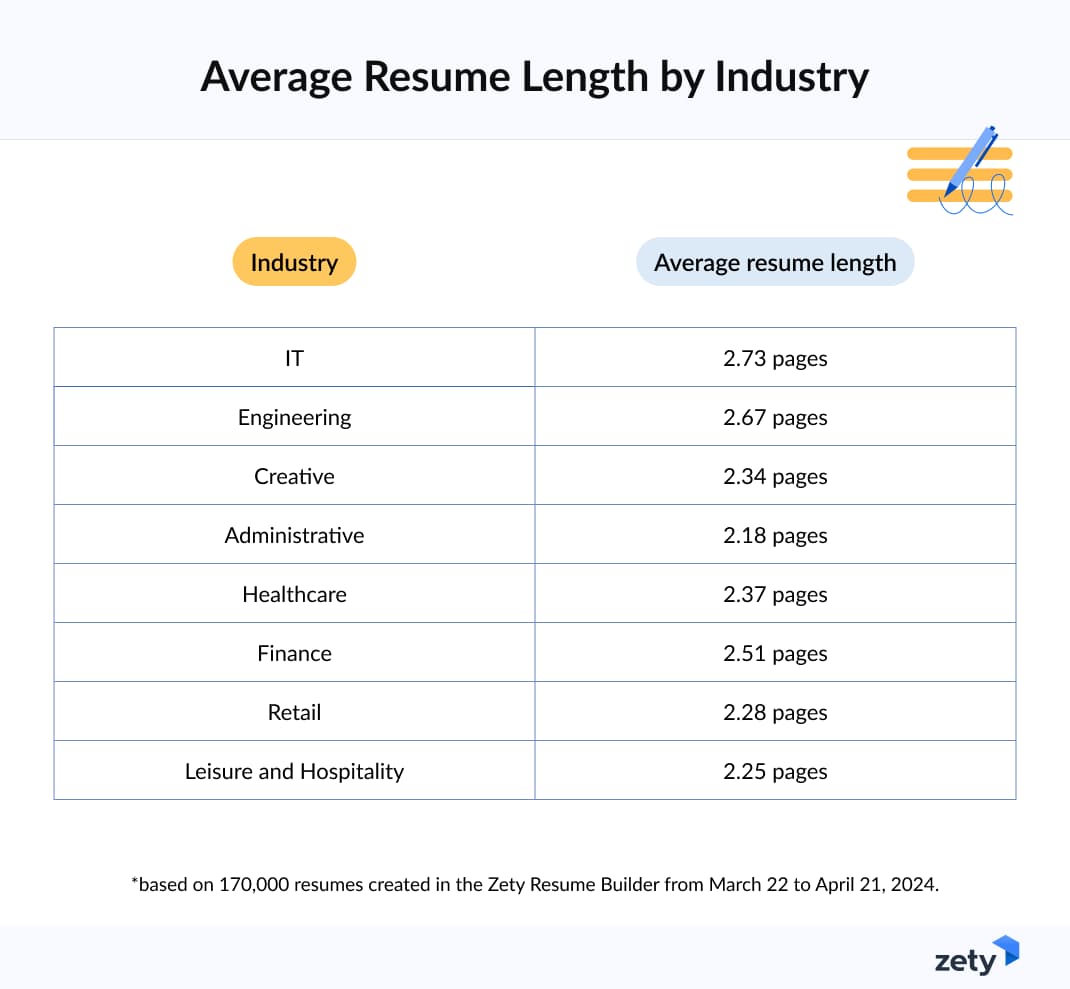
Job Titles With the Longest and the Shortest Resume Lengths
I’ve also decided to analyze which professionals, across all economic sectors, create the longest and the shortest resumes. I wasn’t surprised to see that the longest resumes belong to roles that are usually not entry-level jobs. To help you grasp my findings, have a look at this infographic:
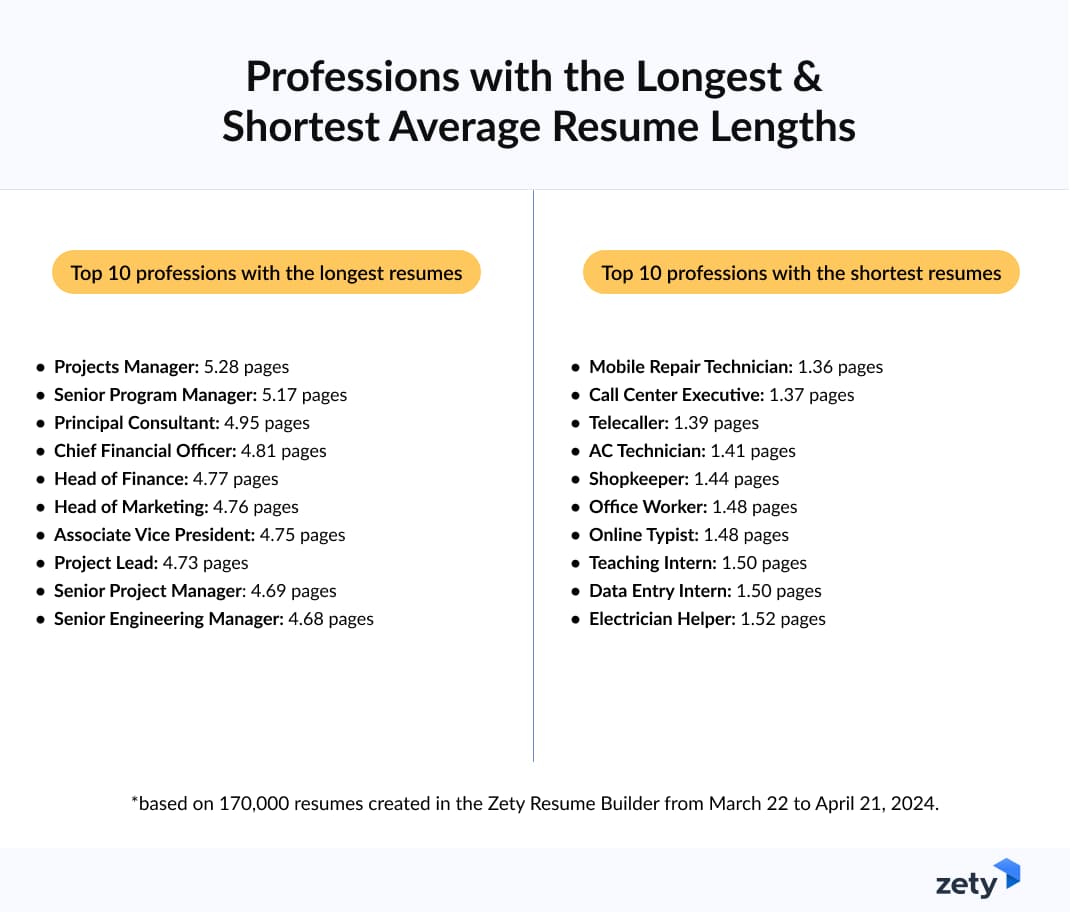
Resume Length Variation by Experience Level
The data also confirmed what I already knew—the average resume length is closely tied to the seniority level. Check out some of the most popular professions and their average resume lengths grouped by seniority level.
Entry-Level Positions:
- Intern: 1.1 pages
- Junior Assistant: 1.2 pages
- Telecaller: 1.2 pages
- Data Entry Clerk: 1.3 pages
- Retail Associate: 1.3 pages
- Waiter/Waitress: 1.99 pages
- Delivery Driver: 1.4 pages
- Office Assistant: 1.5 pages
- Customer Support Representative: 1.5 pages
- Receptionist: 1.7 pages
Mid-Level Positions:
- Sales Representative: 2.2 pages
- Office Manager: 2.4 pages
- Project Coordinator: 2.9 pages
- HR Specialist: 2.6 pages
- Marketing Specialist: 3.0 pages
- Financial Analyst: 4.1 pages
- Operations Director: 4.0 pages
- Software Engineer: 2.43 pages
- Technical Support Specialist: 2.9 pages
Senior-Level Positions:
- Projects Manager: 5.28 pages
- Senior Engineer: 4.7 pages
- IT Consultant: 4.5 pages
- Architect: 4.3 pages
- Chief Executive Officer: 3.92 pages
- Chief Marketing Officer: 4.2 pages
- Executive Director: 4.0 pages
- Senior Product Manager: 4.22 pages
- Senior Staff Nurse: 2.97 pages
- Senior Accountant: 3.08 pages
The difference is even more visible if we calculate the average resume length for each seniority level:
- Entry-Level Positions: Approximately 1.46 pages
- Mid-Level Positions: Approximately 3.30 pages
- Senior-Level Positions: Approximately 4.13 pages
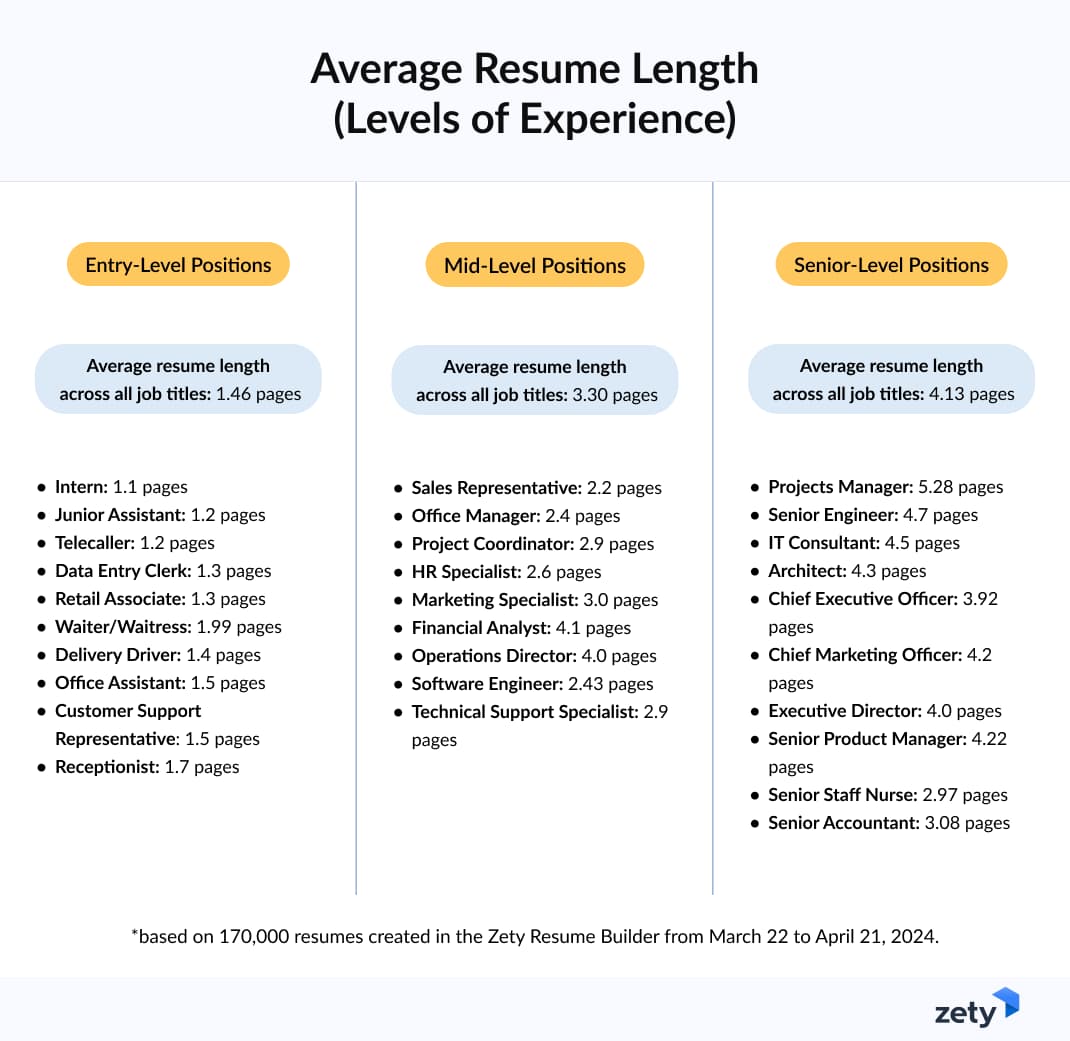
Summary
Here are the most important findings from our study:
- The average resume length across all positions is 2.59 pages, while the median resume length is 2.47 pages.
- Resume length tends to be higher for industries requiring vast technical skill sets, with professionals working in the IT and engineering industries having the highest average resume lengths at 2.73 and 2.67 pages, respectively.
- The longest resumes are written by senior-level professionals and executives, with CEOs’ resume length averaging 3.92 pages and executive directors’ resume length at a total of 4 pages.
Methodology
The results of this study are based on the analysis of over 170,000 real professional resumes written by users of the Zety resume builder—women and men of different ages from different locations, industries, and career stages. The analyzed documents were created from March 22, 2024, to April 21, 2024.
Fair Use Statement
Don't miss the chance to share these results—you might regret it! If you think this information will be of interest to your audience, feel free to share it for non-commercial purposes. In return, we ask that you link to this page so your readers can see the entire study.
About Zety’s Editorial Process
This article has been reviewed by our editorial team to make sure it follows Zety's editorial guidelines. We’re committed to sharing our expertise and giving you trustworthy career advice tailored to your needs. High-quality content is what brings over 40 million readers to our site every year. But we don't stop there. Our team conducts original research to understand the job market better, and we pride ourselves on being quoted by top universities and prime media outlets from around the world.


